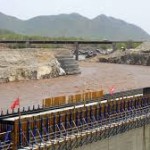 A state of controversy and conflict has been ongoing between Egypt and countries of the Nile Basin for the last four years, as politicians and experts have failed to reach a legally binding agreement for joint management of the Nile River waters. This has led to a move toward involving civil organizations and institutions to find popular alternatives to negotiations in an attempt to bridge the gaps between points of view and reduce the tensions between countries of the Nile River Basin.
A state of controversy and conflict has been ongoing between Egypt and countries of the Nile Basin for the last four years, as politicians and experts have failed to reach a legally binding agreement for joint management of the Nile River waters. This has led to a move toward involving civil organizations and institutions to find popular alternatives to negotiations in an attempt to bridge the gaps between points of view and reduce the tensions between countries of the Nile River Basin.
To that end, a meeting was held at the beginning of December in Cairo among representatives of Egyptian, Sudanese, South Sudanese, Ethiopian and Eritrean civil society organizations, backed by UNESCO and the Arab Water Council in an attempt to guarantee the ability of civil organizations to bridge diverging viewpoints and end the dispute between countries bordering the Nile River. The meeting also aimed to reduce the effects of the various governments’ political conflict on the relations between the peoples of the Nile River Basin, find a way to maintain an open line of communication between these peoples, empower the culture of peace and minimize the effects of any official attempts to exacerbate the conflict or cause damage to any of the countries that border the Nile.
The two-day discussions, attended by Al-Monitor as part of the corps of representatives from civil society, international donors and governmental agencies, ended with the possibility of nongovernmental organizations (NGOs) playing an effective role in strengthening the lines of communication between Nile Basin countries and the adoption of a social services agenda that benefits the people of the region. Attendees agreed on the formation of teams that would exchange information pertaining to water and sanitation needs, as well as to prompt governments to hasten the process of solving the people’s problems, promising to overcome remaining hurdles and providing the needed financial and political support.
Disagreements between Egypt and the other Nile River Basin countries, especially Ethiopia, have escalated following the insistence of Addis Ababa’s government on building the Renaissance Dam on the Nile, to which Cairo objects for fear that it might compromise Egyptian water security and reduce its share of water. Negotiations between technical committees from Egypt, Sudan and Ethiopia have failed, so far, to reach a clear understanding on the dam. Furthermore, Egypt refused in May 2010 to join the Entebbe Nile River Basin Initiative treaty, because it contained articles that did not recognize Egypt’s historically established quotas of Nile waters and gave signatory states the right to build facilities on the Nile without consulting with downstream countries.
Menjichia Werkineh, a leader of one of the Ethiopian NGOs that deal with water issues, told Al-Monitor, “It is necessary for governments to again sit around the negotiating table and find solutions to all contentious articles and subjects, without creating political problems between the countries of the Nile Basin. There is no time for conflict at this time, when peoples are suffering from poverty, hunger and disease and at a time when they possess important water resources that can be exploited for everyone’s benefit.”
“We are working on programs to support the Nile Basin Initiative, educate NGOs and involve them in solving water issues, as well as conduct field work in remote areas of Nile Basin countries aimed at providing water and sewage services, in addition to supporting popular discourse between civil organizations in remaining Nile Basin countries,” he added.
Read more: http://www.al-monitor.com/pulse/originals/2013/12/egypt-business-renaissance-dam.html##ixzz2oiEkTziC





















![23-year-old Ethiopian surprises his mother with a cheque that pays off her mortgage [May 2013] 23-year-old Ethiopian surprises his mother with a cheque that pays off her mortgage [May 2013]](https://www.ethiopianopinion.com/wp-content/plugins/top-10/timthumb/timthumb.php?src=http%3A%2F%2Fwww.ethiopianopinion.com%2Fwp-content%2Fuploads%2F2014%2F03%2Fdearmother-150x150.jpg&w=&h=&zc=1&q=75)






Join Conversations